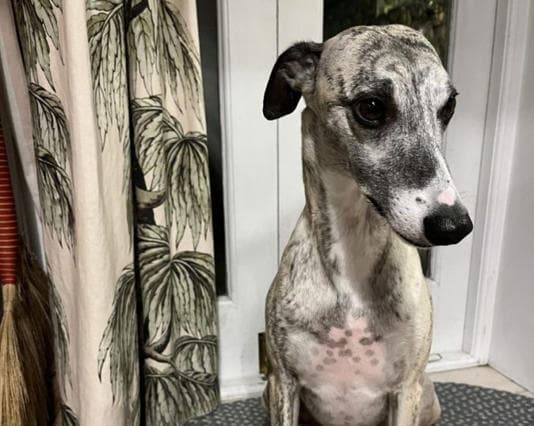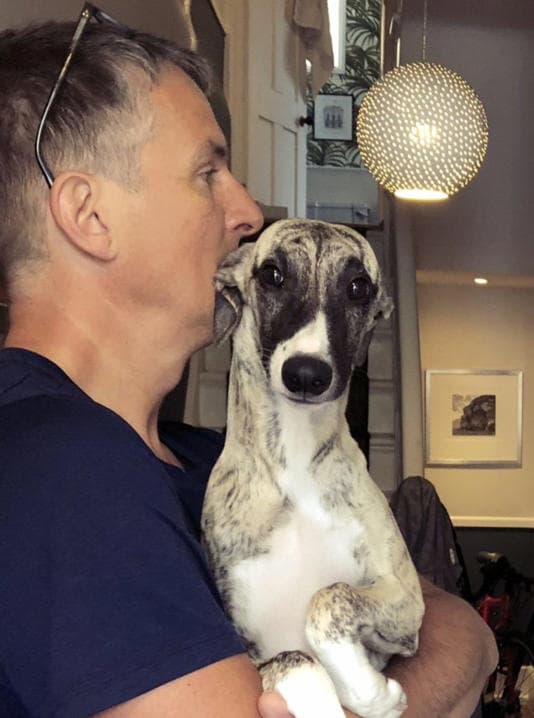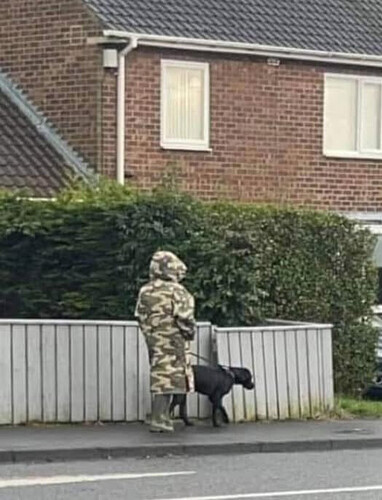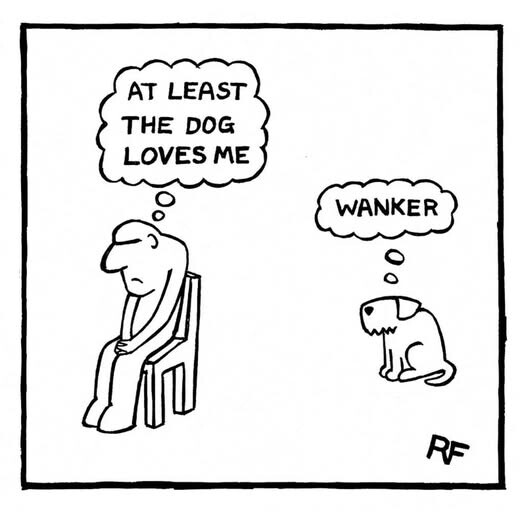:0)
I regret my anxious whippet – his neediness has ruined my life
Story by Victoria Young
If you are the parent of a child who is currently begging you to get a dog, swearing blind that they will be in charge of walking and feeding them, I have three words of advice: don’t do it.
This has nothing to do with whether your child keeps their promise or not: obviously, they won’t. It’s far more fundamental than that, and I’m just going to tell it to you straight: it will ruin your life.
Or rather, getting a dog – a very beautiful, extremely nervous whippet called Tiger – has ruined mine.
I was always adamant that we could not get a dog. There were too many cons – mostly the fear of living in the smelly doggy house that no one wanted to visit – and not enough pros.
But I did not account for the efficiency of the years-long campaign conducted by my then nine-year-old son and his cousins. Nor for the fact that, six years ago, my sister – very suddenly and out of the blue – would cave before me and suggest we get dogs together and share the care. It was a foolproof plan.
How were we to know that the two puppies we got – the cutest brindle brothers I have ever seen – would fight ferociously non-stop, like lion cubs.
We quickly had to shelve the sharing plan. And, having got a dog in haste, I was left to repent at leisure.
Look. It’s not to say I don’t love Tiger. I really do. Nothing makes you feel as cherished as an adoring pup running frenzied laps of excitement around the room with your slipper in his mouth at the sheer joy of your return home. Or his tender devoted companionship when you are unwell.
But somehow I missed the memo that, elegant and loyal though they may be, whippets are constitutionally the most needy, high-maintenance, and anxiety-prone creatures the world has ever known.
Victoria’s dog Tiger hates being alone and will destroy furniture when anxious
As long as the household revolves around him and things are just the way he likes them (all of the pack at home, no visitors), he is absolutely fine. But if they aren’t and we, say, have some friends over for a glass of wine in the garden? Well, he’ll slip off to the living room and do a little protest pee on the carpet. Or he will exact revenge in a more pointed way, like chewing into mangled oblivion one of the brand new (and yet out of stock, so impossible to replace) Birkenstocks your friend has left in the hallway.
But the erratic house training and petty hate-crimes are the least of our worries. And the expense isn’t the issue either – although the dental treatment (£50 every two months), dog walker (£15 twice a week; £45 a day for holiday board), and designer beds from Charley Chau (I’m too fearful of judgment to name a price) not to mention the portrait I commissioned from my friend for my husband’s birthday (mate’s rates – but still) – really add up.
The real reason for my regret is that the dog just cannot bear to be alone. If we leave him, he starts to howl in the most forlorn, desolate, and heartbreaking manner, and he doesn’t stop until we get back. We know this because we bought a Tiger-cam to see how he is when we are not there. Bad idea. He intersperses sitting on the sofa, howling like a wolf, with running around wreaking the kind of havoc caused by a burglar ransacking the house for drug money, pulling egg boxes and anything chewable off surfaces to destroy in a frenzied demonstration of his angst. Turns out that it’s quite hard to go out for dinner and enjoy yourself knowing that your little furry friend is paying the price in heartache.
The obvious solution is to bring him with us when we go out. But that’s a problem too. He really hates the pub. And restaurants (even dog-friendly ones like Bellanger, which hand-makes their dog biscuits and is like a doggy rave on a Friday night). Or being anywhere other than home. With the pack.
But rather than just quietly getting on with hating it, he needs to transmit his experience to us so that we know what a terrible time he is having and, indeed, join him in his discomfort. If we take him out with us, he refuses to just curl up under the table and sleep, and instead stands gently tugging on the lead, sometimes ramping it up to a full-blown tug of war if he thinks we are having too much fun and not thinking about him. It’s a bit like a dripping tap. Or someone thrumming their fingers on your head. Quite hard to ignore.. It’s usually easier to just go home.
What he loves to do most is spend his day languidly drifting between his various designer beds with at least one of us on hand to tuck him in just the way he likes it. Before he can settle, he has to be wrapped, draped, and swaddled – in a very particular way – in the various blankets that adorn his bed. To an onlooker, the optics are that he is in charge and we are his servants. The optics are spot on. He’s like Little Lord Pup-leroy.
But if we don’t help him to organise his blankets – just so – he begins to relentlessly dig as if he is tunnelling his way out of prison. Or he’ll chew the bed furiously, leaving it in tatters.
I know what you’re thinking: get a dog trainer. Well, at one stage we paid through the nose for a dog behaviour expert to try to stop him fighting with his brother. That training did a great job of getting him to walk to heel and sit on command, but on the separation anxiety, not so much.
Then lockdown came and our togetherness really doubled down on the problem. Our dog walker is a pro who has given us numerous behavioural tips, but none seem to calm his little whippet brain enough to simply enjoy some me-time and just chill – like a normal dog – when we go out.
In many ways, he reminds me of an 80s supermodel. He thinks he can get away with murder just because he is so good-looking; he doesn’t get out of bed until noon – and he point-blank refuses to leave the house until he’s ready.
Sometimes, of course, we have to impose our will on him and take him out for a walk earlier than he would like. But trying to force a quietly opinionated whippet to do anything they don’t want to do is a fool’s errand; a battle of wills that we are destined to lose.
Even when the world is revolving around him and everything is in order, he is sometimes put out for no apparent reason and can be very stand-offish, a bit like the fastidious Niles Crane from Cheers. He literally gets up and moves away if you sit next to him on the sofa. Or rather, if I do.
Whippets are constitutionally the most needy, high-maintenance, and anxiety-prone creatures the world has ever known, says Victoria Young
With my husband, however, it is a different matter. Tiger adores him – slavishly. He’ll literally stand on his chest in a bid to get as close to him as possible. My theory is that Tiger imprinted on him when they first met, and – bear in mind my husband was the reluctant one in this venture – they quickly developed a Vulcan mind link.
Tiger adores Top Dog (as my son and I jealously call him) with an ardour that is unwavering and possessive. If ever we have a spontaneous hug, our tender moment will inevitably be interrupted by another warm body physically intercepting our togetherness. Just the three of us.
Their bond is sweet but brings with it a practical issue: Tiger is reluctant to go anywhere unless Top Dog comes too, which makes walking him alone tricky. If I try to take him to the park solo, in protest that the pack is missing its leader, Tiger will just dig his heels in, put his doggy brakes on, and point-blank refuse to walk anywhere but home.
I’m not entirely resigned to our fate. Every so often, I boldly suggest a weekend plan that involves us being out of the house for more than three hours – an art gallery or movie and dinner, say, rather than having to pick one – before being reminded of the little pointy-nosed jailer demanding our presence back at home. And when that happens, I resolve to contact the Dog Father or another celebrity hound expert to see if they will solve the problem.
But somehow I have not yet done this, I suppose because Tiger has gaslit us all into thinking this is normal doggy behaviour.
In the meantime, I was sharing my various woes with a fellow dog-owning friend the other day, expecting sympathy. Her response was sobering: the way that dogs behave is made, not born. In other words, we have only ourselves to blame. It’s not the dog that is the problem – it’s us.








